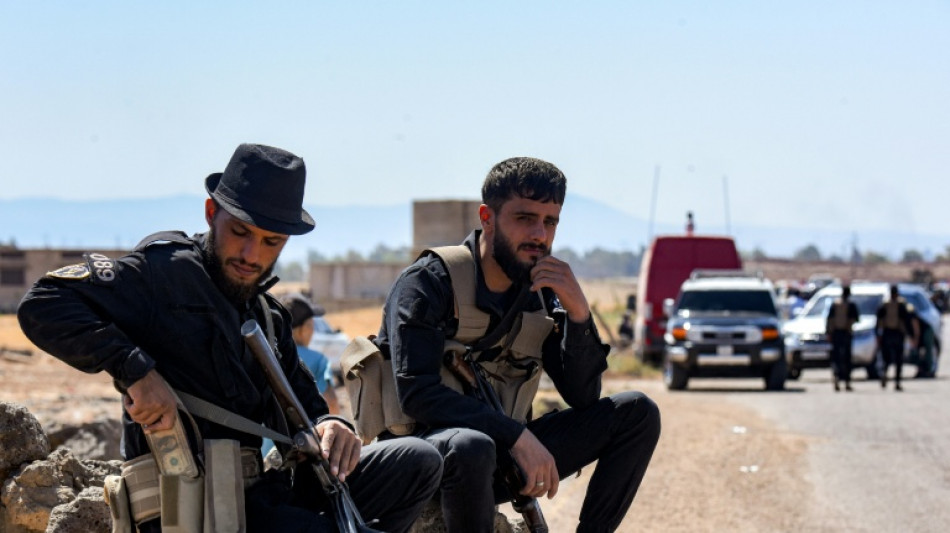
SCS
-0.1300


At least 89 people were killed in the southern Syrian province of Sweida as clashes between Sunni Bedouin tribes and Druze fighters raged for a second day Monday, a monitor said.
As the violence escalated, Israel -- which had previously warned that it would intervene in Syria to protect the Druze -- said it struck "several tanks" in Sweida, without providing further details.
The fighting underscores the challenges facing interim leader Ahmad al-Sharaa, whose Islamist forces ousted president Bashar al-Assad in December, in a country reeling from 14 years of war.
The Syrian military and interior ministries announced troop deployments, safe corridors for civilians and a pledge to end the fighting "quickly and decisively".
The violence began Sunday when Bedouin gunmen abducted a Druze vegetable vendor on the highway to Damascus, prompting retaliatory kidnappings.
Though hostages were later released, the fighting carried on Monday outside Sweida city, with mortar fire hitting villages and dozens wounded, said the Suwayda 24 news outlet.
The streets of Sweida were deserted, with an AFP photographer reporting gunfire during funerals.
"We lived in a state of extreme terror -- the shells were falling randomly," said Abu Taym, a 51-year-old father in Sweida.
"Traffic on the streets is paralysed, and most shops are closed."
Suwayda 24 reported the arrival of "dozens of victims" at hospitals as a result of clashes in the province's western countryside and shelling of villages.
The Observatory, which relies on a network of sources on the ground, raised its death toll to 89, including 46 Druze, four civilians, 18 Bedouin fighters and seven unidentified people in military uniforms.
A defence ministry source told Al-Ekhbariya state television six security forces personnel were killed "during disengagement operations in Sweida".
An AFP correspondent on the outskirts of Sweida city saw vehicles carrying fighters, large interior ministry military convoys, civilian vehicles and motorcycles carrying armed men towards the front lines, as well as ambulances transporting the wounded to hospitals in Damascus.
While Druze spiritual leaders called for calm and urged Damascus to intervene.
Sheikh Hikmat al-Hijri, one of the three Druze spiritual leaders in Sweida, expressed his "rejection of the entry" of general security forces into the province, demanding "international protection".
- 'Lack of state institutions' -
In a Sunday post on X, Interior Minister Anas Khattab said: "The lack of state, military and security institutions is a major reason for the ongoing tensions in Sweida,
"The only solution is to reactivate these institutions to ensure civil peace," he added.
The latest bloodshed follows deadly violence in April and May, when clashes between Druze fighters and security forces in Druze-populated areas near Damascus and Sweida killed more than 100 people.
The Observatory said members of Bedouin tribes, who are Sunni Muslim, had sided with security forces during earlier confrontations.
Local leaders and religious figures brokered agreements at the time to de-escalate the tensions, putting Druze fighters in charge of security in Sweida since May, though armed Bedouins remain present in several areas.
On Sunday, Sweida governor Mustapha al-Bakur urged his constituents to "exercise self-restraint", while Druze community leaders urged authorities to step in.
In response to the violence, the education ministry announced the postponement of Monday's scheduled secondary school exams in the province.
- Israel and the Druze -
Syria's pre-civil war Druze population numbers around 700,000, many in Sweida province.
The Druze, followers of an esoteric religion that split from Shiite Islam, are mainly found in Syria, Lebanon and Israel.
Bedouin and Druze factions have a longstanding feud in Sweida, and violence occasionally erupts between the two sides.
A surge in violence in March targeting the Alawite community -- with more than 1,700 killed -- and the subsequent attacks on Druze areas have undermined confidence in the new Syrian authorities' ability to protect minorities.
In the wake of those incidents, Israel -- which has occupied part of Syria's Golan Heights since 1967 -- cited the protection of the Druze to justify several strikes, including one in early May near the presidential palace in Damascus.
Israel is home to around 152,000 Druze, according to the latest available data, including 24,000 living in the Israeli-occupied Golan, of whom fewer than five percent hold Israeli citizenship.
M.Chau--ThChM